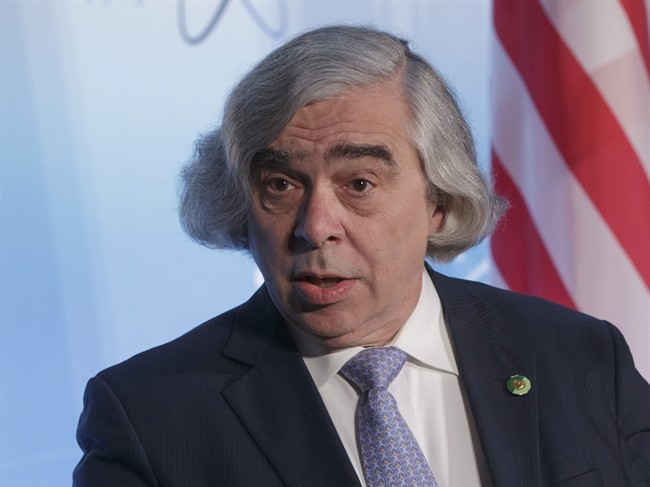The U.S. Energy Department said Wednesday it is offering a conditional, US$2-billion loan guarantee for a carbon capture project at a planned Louisiana methanol plant.

The captured carbon dioxide will be piped to oil fields in Texas, where it will be used to speed up oil production.
Energy Secretary Ernest Moniz called the loan commitment a milestone in federal efforts to capture and store carbon pollution, a key driver of global warming.
Moniz called the Lake Charles project “a big step forward” for economic development and carbon capture, an emerging technology that has also been pioneered in Canada.
The Boundary Dam coal power station near Estevan, Sask., has been using carbon capture and storage technology for about two years – possibly the world’s first commercial-scale use of CCS.
READ MORE: Saskatchewan carbon-capture plant hits 800,000 tonnes of CO2 in one year
Carbon capture entails catching the carbon emissions from a coal plant or other source and injecting the gas underground for permanent storage or use in speeding oil production.
Carbon storage is a key component of so-called clean coal, a concept that has been embraced by President Barack Obama and President-elect Donald Trump.
In Canada, by contrast, the Trudeau government wants to phase out the country’s 35 remaining coal-fired power plants by 2030.
Saskatchewan’s government under Premier Brad Wall has argued for carbon capture and storage and against the imposition of a national carbon-pricing strategy that was accepted by eight other premiers early this month.
READ MORE: Brad Wall criticizes Ottawa’s plan to phase out coal-fired electricity
The loan guarantee is the first to be offered by the U.S. Energy Department under an advanced energy program to help promising technologies that are unable to secure private investors.
Lake Charles Methanol expects to break ground next year on a $3.8 billion plant in Lake Charles, Louisiana, 140 miles east of Houston.
Don Maley, the company’s president and CEO, said in a statement that the Energy Department’s expected loan guarantee “represents the commitment of the federal government to promote innovative, clean fossil-energy technologies” and allow the project to be completed.
The project is expected to create about 1,000 construction jobs and 500 permanent jobs. The plant will produce methanol, hydrogen, carbon dioxide and other chemicals from petcoke, a waste product from the refining of heavy crude oil.
Moniz said on a conference call Wednesday that he has had “cordial” conversations with former Texas Gov. Rick Perry, Trump’s nominee for energy secretary, but did not discuss the Lake Charles plant or other projects under consideration for Energy Department loans.
With files from The Canadian Press

Comments